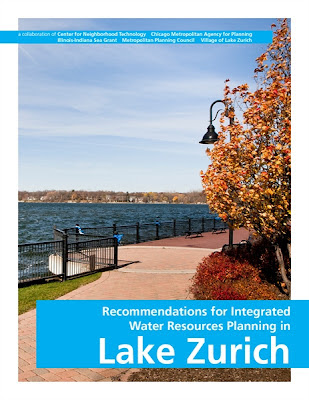“The USACE works to restore degraded ecosystems to a more natural condition through large-scale ecosystem restoration projects, such as the Comprehensive Everglades Restoration, Louisiana Coastal Area Ecosystem Restoration, Chesapeake Bay Oyster Recovery, Aransas National Wildlife Refuge Beneficial Use of Dredged Material (restoration of marsh critical to the endangered Whooping Crane), and Houston Ship Channel Beneficial Use of Dredged Material (marsh restoration in Galveston Bay), and by employing system-wide watershed approaches to problem solving and management for smaller ecosystem restoration projects.”
Category:
Ecosystem restoration takes a big effort and big engineering
July 12th, 2012 by Irene MilesLake Zurich water resources planning report now available
June 12th, 2012 by Irene MilesThe report combines study and information of a wide range of factors in order to provide appropriate recommendations for planning the community’s use of water.
Recent News
- IISG’s Eliana Brown wins 2025 Illinois Extension Excellence Award
- We’re hiring eight interns for summer 2026
- In 2026, IISG intends to fund 10 research projects focused on coastal concerns
- IISG looks back on 30 years of AIS outreach
- New step-by-step guide and veterinary brochures expand UnwantedMeds.org resources
IISG Instagram
From supporting cutting-edge research to empowering educators, students, and Great Lakes communities, 2025 was a year of collaboration, learning, and impact.
Thank you to our partners, researchers, educators, and community members who made it all possible. Here’s to another year of protecting, exploring, and sustaining the Great Lakes!

Register Now for HASTI 2026! The early bird registration rate expires tomorrow!
We’re excited to be presenting The Watershed Game at the conference. The game is a hands-on activity that helps educators and students explore water quality, land use, and community decision-making.
✅ Don’t miss this opportunity to connect with fellow educators and bring new tools to your classroom!
📅 Event Details & Registration at the link in bio.

Keeping on top of your farm finances can be a daunting task, but knowing what numbers to track, what the numbers mean, when to spend, and when to save can be critical for the long-term health of your aquaculture business finances.
This webinar series will provide you with an overview of practical information for managing your farm’s finances. All webinars begin at 12pm ET. Registrants will be sent a webinar recording. All recordings will be added to a YouTube playlist on Ohio Sea Grant and Illinois-Indiana Sea Grant YouTube pages.
Learn more at the link in bio.

Educators—this is for you!
Unlock the potential of Great Lakes education with the latest issue of the Center for Great Lakes Literacy newsletter. Explore exciting opportunities like vessel-based learning, an aquaculture competition, and classroom-ready resources on maritime heritage, harmful algal blooms, invasive species, and more!
Learn more at the link in bio.

Categories
- Aquaculture
- Aquatic Invasive Species
- Buoys
- Climate Ready Communities
- Coastal Resilience
- Director's Blog
- Education
- Featured
- Fellowships
- Fisheries
- Funded Research
- Funding
- Great Lakes Cleanup
- Great Lakes Data
- Healthy Waters
- Internships
- Jobs
- K-12 Education
- News
- Photos
- Program
- Recreation & Tourism
- Resources
- Sea Grant Scholars
- Stormwater & Green Infrastructure
- Sustainable Community Planning
- The Helm
- Uncategorized
- Video
- Water Resource Economics

